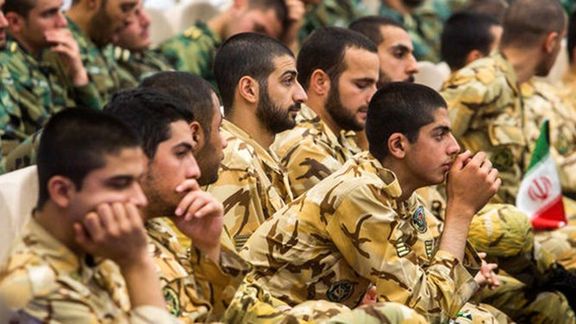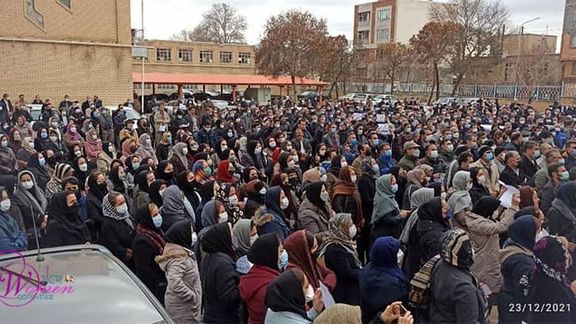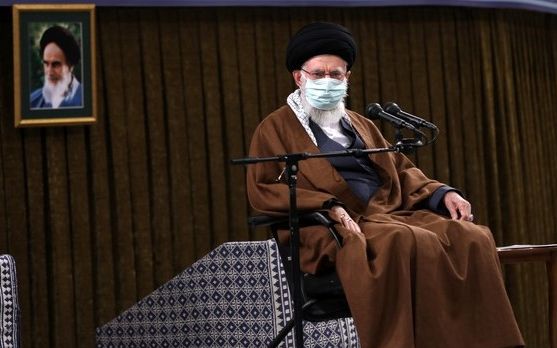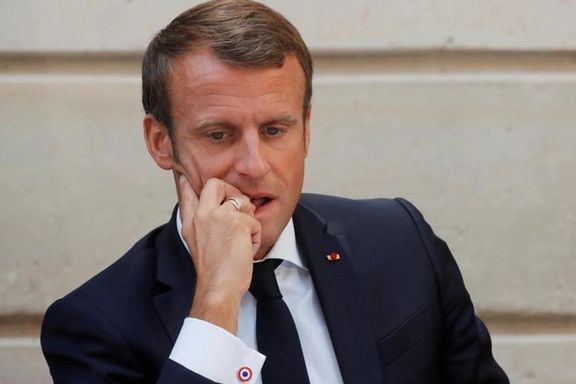Iran To Allow Buy-Out Of Military Service, For The Rich

Iran has announced it will reinstitute a buy-out scheme for the country’s compulsory military service, but only affluent people can afford the fees mentioned.

Iran has announced it will reinstitute a buy-out scheme for the country’s compulsory military service, but only affluent people can afford the fees mentioned.
According to parliament’s budget review committee spokesman on Saturday, the scheme has received preliminary approval and if it is adopted, Iranian men can buy out their military service as of the next Iranian year starting March 21.
The new plan only includes the absentees who are over 35 years old or at least eight years have passed from their conscription due date, the prices differing based on the levels of education, with those with higher education having to pay higher fees.
The new rates start at 2.5 billion rials (nearly $10,000 at today’s rates) and goes up to 6 billion rials, which are about 11 to 24 times more than the last time the government allowed such exemptions. Average salaries in Iran are about $200 a month.
The option to buy out of the draft was removed from regulations about three years ago because even then only wealthy families could afford it for their sons through paying absence fines.
According to Iran’s constitution, all men over 18 years old must serve in the military for about two years otherwise they cannot apply for a passport to leave the country.
Earlier in the month, a member of the budget committee said that all expats who haven’t served their compulsory conscription can pay €15,000 ($17,000) to buy their freedom.

A conservative Iranian lawmaker has warned of massive uprisings in the country if the economic situation keeps deteriorating in the coming months.
Criticizing President Ebrahim Raisi’s decision to slash food subsidies, Ahmad Naderi said on Sunday that the government is on the wrong path on some issues.
He said that Raisi’s proposed reforms in the next year’s budget can endanger the entire Islamic Republic regime.
Raisi has been pushing to end cheap dollars allocated by the government to importers of essential food and medicine, as it faces a huge budget deficit.
Naderi also slammed the policies of former president Hassan Rouhani, saying that Raisi’s government cannot bring about miracles and undo “the catastrophes” that happened during eight years of Rouhani’s “neoliberal administration” in several months, but the new government should be in the right track.
“I warn that if these approaches continue, we will reach a point where we will see great social upheavals”, he said.
Earlier in the day, the parliament's budget review committee rejected Raisi's plans to eliminate the cheap dollar subsidy.
Workers and employees from various economic sectors, including teachers, nurses, firefighters, and even staff members of the judiciary department, hold regular protest rallies or strikes to demand better working conditions and salaries.
Food prices have risen by more than 60 percent in recent months, on top of high inflation in the previous three years, while the government is unable to sufficiently boost wages as United States sanctions impede full capacity oil exports and international trade.

‘Maximum pressure’ sanctions by the United States have clearly failed, Iran’s Supreme Leader Ali Khamenei declared Sunday, quoting the US State Department.
Calling sanctions an “economic assault” Khamenei said that it caused some hardship for the people “but production did not buckle and the spokesman of America’s foreign ministry a few days ago frankly and explicitly announced that the maximum pressure policy has turned into a humiliating defeat for America.”
Khamenei was quoting State Department spokesman Ned Price who in his press briefing on January 25 said, “The maximum pressure campaign was an abject failure,” adding that former president Donald Trump’s policy did not change Iran’s behavior.
Iran’s economy went into a tailspin in 2018, when Trump withdrew from the 2015 nuclear agreement and imposed tough sanctions. Inflation skyrocketed and government budget deficits soared. The sanctions also impacted Iran’s proxy forces in the region, but they continued their destabilizing operations, although they could have been more effective without the sanctions.
In a speech to managers of Iran’s industrial and economic sectors Khamenei reiterated his ideology of self-reliance and called for “economic jihad” in defiance of sanctions, although he admitted that Iran’s economy performed very poorly in the last decade. At the same time, he claimed victory against US sanctions, that he said were meant to foment dissatisfaction among the people.
But as usual, the Supreme Leader blamed presidential administrations instead of the political and economic systems he presides over and his own policy of perpetually confronting the West and regional countries which have good ties with the United States.
Iran’s centralized economy plagued by corruption and mismanagement, as well as under the pressure of oil export sanctions has had zero growth in the past decade. Even before nuclear sanctions kicked in from 2011, its growth on average was anemic at under 3 percent since the early 1980s.
But Khamenei who has been in power since 1989, increasingly relied on loyal hardliners, and resorted to political persecutions and engineered elections instead of allowing a more accountable political system to take root. At the same time, insiders and the military took over the state-run economy using oil export revenues to perpetuate an unproductive system, as they enriched themselves.
In his speech Khamenei expressed disappointment at low GDP growth, lack of investments, a fast-growing liquidity problem leading to inflation and other serious problems the country faces. He emphasized however, that these difficulties are not just due to sanctions but also an outcome of “wrong decisions or lack of effort.”
He then mentioned a series of problems facing Iran’s domestic production sector, such as low quality of products, highlighting the auto industry which has been blamed for high fatalities in road accidents recently. Nevertheless, he reiterated that self-reliance should be the motto.
Khamenei and other insiders in the Islamic Republic system fail to understand or acknowledge that a modern economy can only grow with less government interference, more interaction with other economies, investments and competition. But the Supreme Leader’s domestic quest to reward supporters and continue a confrontational foreign policy, as well as a nuclear program with military ambitions foreclose paths toward economic success.

Iranian parliament's budget review committee has rejected President Ebrahim Raisi's reform to eliminate the cheap dollar subsidy for importing essential goods.
The decision can add to the government’s huge budget deficit as United States sanctions impede full capacity oil exports and international trade.
The committee's spokesman, Rahim Zare, told reporters Saturday that the committee did not approve the reform because the draft budget bill was ambiguous, and the government has not provided a written proposal to explain how it will make up for the removal of subsidized dollar.
The subsidized rate which is usually referred to as the "preferential rate", was introduced by the administration of President Hassan Rouhani when the national currency began to lose value in early 2018 and food prices began to climb. The cheap dollars are provided to importers at 42,000 rials, instead of the current free market rate of around 280,000 rials to one US dollar.
The government has spent a minimum of $8 billion a year since April 2018 to finance subsidized essential imports. The subsidy weighs heavily on Iran’s depleted reserves.
Eliminating the “cheap dollar’ subsidy would raise prices of essential goods by five to six times, economists and critics have said, but would also help make up for some of the huge budget deficit the government faces amid US sanctions.
The ad hoc administrative budget bill review committee known as Talfiq (Reconciliation) Committee, consists of members of the Planning, Budget, and Auditing Committee, and representatives of other committees. The committee presents its report on the bill to the parliament for further considerations and assessment.
Zare said the committee has decided to allocate $9b at the 42,000 rial rate to importing medicine, medical equipment and other essential goods excluding wheat. Instead, the committee has decided to allocate a budget to increase the purchase price of wheat paid to domestic farmers.
In the current year, according to Zare, the government has spent around $15b for importing essential goods. This is far higher than figures mentioned by officials in previous years.
The parliament in November delayed a bill to amend the current fiscal year's budget law (ending March 20) that would have replaced the subsidy with monthly cash handouts of 1.1 million rials (less than $4) to 60 million low-income Iranians. This meant the government should resort to inflationary measures, such as borrowing from the Central Bank, to remedy the current year's budget deficit this year.
The committee has also rejected the government's request to be allowed to slash the amount it is required to pay the National Development Fund (NDF) from oil sales by half to finance its budget next year. According to the NDF charter, 40 percent of oil revenues should be saved by the government in the fund for investment on productive economic activities that would guarantee the welfare of future generations. NFD is a sovereign wealth fund.
Zare said the committee rejected the proposal because the government did not have the Supreme Leader Ali Khamenei’s authorization to cut back its 40 percent contribution to the NDF but the proposal can be reconsidered if the government acquires such permission before the budget bill's final ratification by the parliament.
A possible agreement in the Vienna nuclear talks and reduction of US sanctions could go a long way to help the government to overcome its financial woes by increasing revenues from oil exports. In recent days, there has also been talk of unfreezing billions of dollars of assets in South Korea and other countries including Iraq.
President Ebrahim Raisi's presented his budget bill for the next Iranian calendar and fiscal year (beginning March 21) on December 12. He told the parliament that the reform was a pivotal element of the bill. The bill estimated oil exports of 1.2 million barrels per day at an average price of $60. Iran has increased its illicit oil exports since early 2021 because of apparently less vigorous enforcement by the Biden Administration.

Iranian President Ebrahim Raisi and his French counterpart Emmanuel Macron have discussed ways to quicken the pace of Iran's nuclear talks in Vienna.
In a telephone conversation on Saturday, Raisi reiterated Tehran’s position that removal of sanctions, verification, and credible guarantees are the basic requirements for any deal in Vienna.
Raisi told Macron that "the Islamic Republic has already proven its resolve and seriousness for the realization of the agreement”, adding that any effort by the other side should incorporate Iran’s threefold demands.
Raeisi noted that the US itself has admitted that the former administration's decision to leave the 2015 deal and reimpose the so-called maximum pressure campaign had ended in failure.
During the phone call, Macron insisted that a deal is still possible if all parties give clear and sufficient commitments, stressing the need to accelerate the pace of the talk for achieving tangible progress.
The Élysée said Macron condemned Iran-backed Houthis' attack against the UAE, adding that he also expressed concern about the situation of jailed French national Benjamin Brière.
Macron also asked Raisi to immediately release 62-year-old anthropologist Fariba Adelkhah, who has been detained in Iran since 2019 on vague political charges.
The Iranian and French presidents also talked about the situation in Lebanon, where the influence of Iran-backed militant Hezbollah has sparked tensions in the sectarian country.

Voices calling for direct talks with the United States continue to be heard in Iran, as top officials recently signaled a shift in their hardline position.
Moderate conservative website Aftab News in Tehran called on Iranians not to scorn the country's officials for delaying direct negotiations with the United States now that they have indicated a policy shift to serve the country's interests.
Instead, the people should support the government for the right choice they have made by distancing themselves from irrelevant factional interests, the website wrote on Saturday, January 29.
The website was probably referring to Qom seminary clerics who called on Iran's Foreign Minister Hossein Amir-Abdollahian to backtrack from his declared position in support of direct talks, or to hardliner Kayhan's editor Hossein Shariatmadari who forced Security Chief Ali Shamkhani to repent and take back his statement in favor of direct negotiations.
Aftab News praised Amir-Abdollahian for softening his positions regarding nuclear talks aimed at reviving the 2015 agreement known as the JCPOA, mindless of the fact that such a shift would have not been possible if Supreme Leader Ali Khameneri had not signalled his agreement on January 9.
The website added that Iran can defend its interests in the international community while at the same time preserving its principles. The website called the shift in Iran's foreign policy "a reasonable shift." The article was probably part of the attempts to prepare public opinion in case a compromise with the West is made.
Gholamreza Nouri, an Iranian lawyer told Rouydad24 news website in Tehran that the time is over for Iranian politicians who in their speeches say they wish to punch this and that country in the mouth. "It is now in our interest to maintain direct contact with the world and interact with other countries,” he said
Expressing support for direct talks with the United States, Nouri criticized regime politicians who attack the current and former administrations for simply mentioning an interest in interaction with the world. He said in many of those who readily opposed direct talks with the United States have quickly shifted their position, but regardless of their motivation, “we should all be happy” to see that some of the opponents of interaction with America are now supporting the idea of direct talks with Washington.
During the past few days several lawmakers including members of the National Security and Foreign Policy Committee of the Majles have expressed support for direct talks with the United States.
Meanwhile, reformist activist Saeed Shariati told Roiuydad24 website that the public discussion about a dialogue between Iran and the United States has loosened the strong opposition of some regime supporters. He added that direct talks with America will add to President Ebrahim Raisi’s popularity, and even those who did not vote for him in the June 2021 election, will begin to support him.
Raisi was elected in the lowest presidential election turnout in Iran after key rivals were banned from running and has not solved any of the numerous crises facing the country.
According to Khabar Online, last week, following Iranian hardliners' vocal support for relying on Russia and China in Iran's foreign policy, some politicians and observers have come out arguing for a balanced foreign policy.